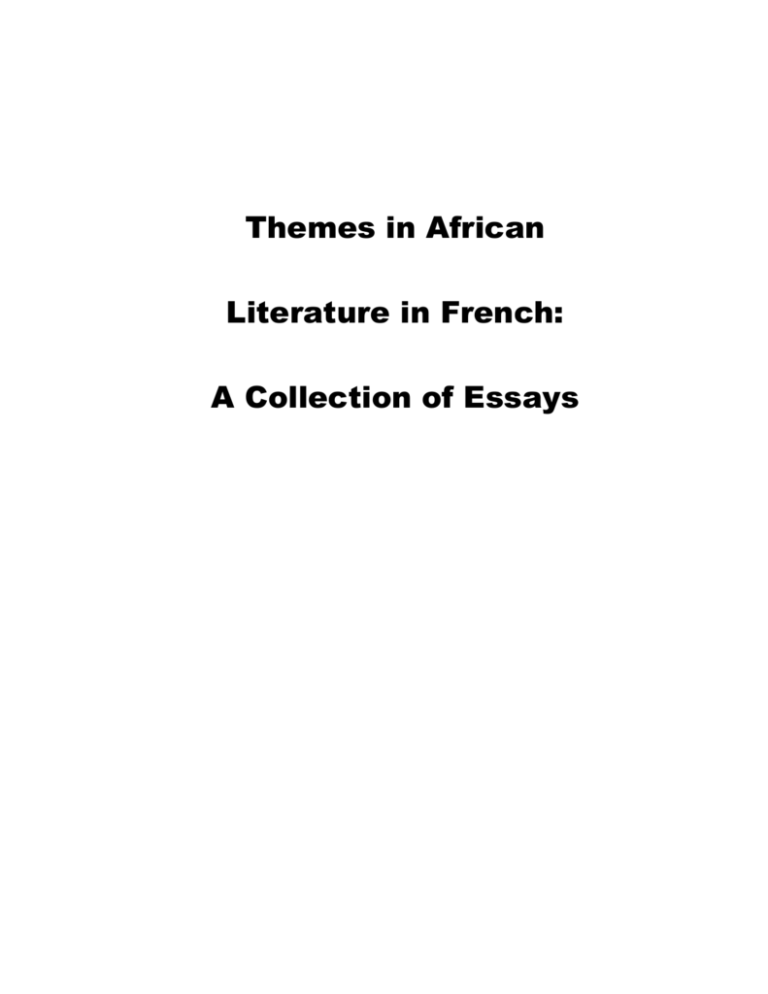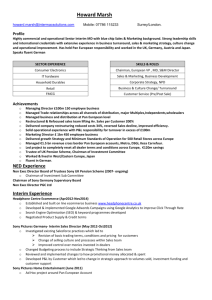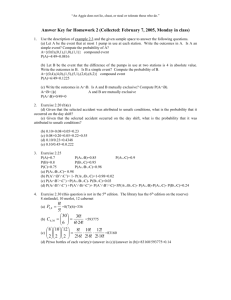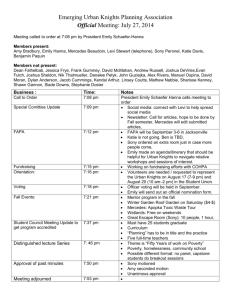the anti-hero" in Sony Labou Tansi`s novels
advertisement

Themes in African Literature in French: A Collection of Essays 10 THE ANTI-HERO IN SONY LABOU TANSI'S NOVELS Mattiu Nnoruka We come to the world to sow: woe betide him-who sows his ruin or his dishonour.1 Sony Labou Tansi INTRODUCTION Born to Congolese parents at Kimwanza on June 5, 1947, Sony Labou Tansi died prematurely in Brazzaville on June 14,1995 after a protracted illness. He was 48. Founder-Director of a theatre troupe, Rocado Zulu, Sony Labou Tansi was not only a playwright, poet and novelist, he was also a politician. His Rocado Zulu afforded him an ample opportunity to tour the world in order to sensitise, through his plays, public opinion on social injustices, repressions and other ills prevailing in his native Congo and elsewhere in Africa. His political party (MCDDI), on the other hand, earned him a seat in the Congolese National Assembly where, unfortunately, he naively believed that pressing political and national issues would be discussed and settled once and for all.2 At his death, the Congolese author left behind a considerable lumber of literary works of various genres: novels, poems, plays, and so on.3 On these productions, critics are unanimous in their verdict: Sony Labou Tansi distances himself from older writers by inaugurating a new dimension in African literature written in French. By this new development his works constitute a landmark in that 185 186 Themes in African Literature in French: A Collection of Essays ___ literature. He himself gives an insight to his stance when he warns in one of his novels that "the world is no longer round, never will it be any longer"4. His peculiar use of the French language, almost comparable to that of Ahmadou Kourouma, is well known and has been studied by certain critics.5 However, if his subversion of the French language with a view to giving his narration a local colour, is one of the characteristics of the new African novel written in French as evidenced in his works, another salient feature and by far the most important in his novels is what Daniel-Henri Pageaux (1985) calls "the revision of the notion of character"6 and which we name, for the purposes of this write-up " the anti-hero" in Sony Labou Tansi's novels. Our chosen topic will be limited to the author's first three novels out of the six already mentioned, namely: La vie et demie, L'Etat honteux and L 'Ante-peuple. The last three do not necessarily tally with the objective of our study. Le commencement de la douleur, announced shortly after the author's demise, is yet to be published. Lesyeux du volcan, inundated with incongruous and episodic actors has, meanwhile, an abstract or silent observer as the main character. This unseen personality could be mother Africa, the world in general or the masses who are watching and waiting for an imaginary revolution.7 Les Sept Solitudes de Lorsa Lopez features a chief character of different category, therefore it is not applicable to our study. Having thus far situated our work, we add that the whole exercise will consist of three major sections sub-headed as follows: hero/ anti-hero: definition and features; Sony Labou Tansi's antiheroes: analysis, and an overview of the ideological relevance of the author's art of characterisation and the conclusion. HERO/ANTI-HERO: DEFINITION AND FEATURES Derived from the Greek word "heros", the term "hero" designates in Greco-Latin mythology a demi-god, a person with supernatural powers. Later and up to date, the term became synonymous with the principal figure around whom the story is built in a work of The Anti-Hero in Sony Labou Tansi's Novels 187 fiction. For example, there is Ulysses in Odyssey by Homer or Aenas in Aeneid by Virgil, the Greek and Roman authors respectively. These individuals are characterised by their extraordinary bravery or courage, their quest for honour and their determination, in spite of all odds, to concretise the aspirations of their people whose fate is necessarily considered to be in their hands as leaders. In his analysis of Georges Lukacs' La theorie du roman,8 Lucien Goldmann (1963), who observes a correspondence between the evolution of the novel and the history of bourgeois society in Europe, brings out three fundamental types of novels with three different principal characters as heroes: Novel of abstract idealism with demoniacal or problematic hero imbued with very narrow conscience in front of a complex world; psychological novel with a passive hero whose soul is too broad to fit into the world; educative novel with a hero whose conscious renouncement to the world is neither resignation nor desperation.9 In a similar line of action, Sunday Anozie (1970), examining the novels of West African authors10, underlines three types of heroes: a hero of "traditional determination" characterised by his allegiance or fidelity to tradition11; a hero of "intro-active determination", otherwise known as a problematic individual12 and a hero of extro-active determination who is detribalised, as well as a champion of socio-political justice with the traits of ideological messianism.13 Unfortunately, neither the heroes studied by Georges Lukacs nor those of Sunday Anozie could fit into our focus. Reflecting two given social and political periods (the bourgeois society on one hand and the colonial and corrupt post-independence Africa on the other hand), these principal characters are subjected to the whims and caprices of the powers that be which, meanwhile, they combat with little or no success. The socio-political context in which Sony Labou Tansi situates the principal figures of his novels is indeed that of post-independence Africa and precisely that period characterised by military intervention in governance and comedy of power tussle among top military officers. As we shall see, the Congolese novelist has no sympathy for the men in the khaki 188 Themes in African Literature in French: A Collection of Essays __ uniform. Those of them who figure as chief characters in his works of fiction are not traditional heroes but anti-heroes. They are the opposite of what the novelist designate as Chief: the chief is not he who commands, it is not even he who is right. The chief is he who invents others' generosity; in the same way he takes part in the crucial matters of his time. The Chief is he who teaches and practices self sacrifice.14 The dictionary definition of anti-hero goes further. The Chambers Dictionary sees him as a "principal character who lacks noble qualities and whose experiences are without tragic dignity"'5 SONY LABOU TANSI'S ANTI-HEROES Military intrusion into politics has provided Sony Labou Tansi with a strategic element of characterisation promoting the thematic and aesthetic components of plot structures. The novelist is not a stranger in military circles where he was once used and then dumped.16 He is, therefore, an insider and the first striking feature associated with the portrait of his principal characters is certainly the absence of a worthy curriculum vitae or civil status. Many of them are of doubtful origin and of dubious character. The Providential Guide, the main character in the author's first novel, La Vie et demie, is not only a criminal but also an impersonator; he is an ex-livestock robber. To escape police arrest, he changes his name from Cvpriano Ramoussa to Obramoussando Mbi before fleeing to the northern part of the country where he joins the army and quickly makes his way to the top. From Obramoussando, he alters his name once again to Loanga and then Yambo and becomes the founder and the First Secretary of the only political party in power. Through an unspecified constitutional intrigue, he rises to the position of president, then life president of the party, a feat that confers on him the official and resounding title of The Providential Guide Marc-François Matéla-Péné or Providential Guide for short; he is later crowned His Majesty Cézama the First. This is the man who initiated a dynasty of military The Anti-Hero in Sonv Labou Tansi 's Novels 189 dictators, alias Guides, who rule, for several generations, a new independent, fictitious African country called Katamalanasie located in the continent's equatorial region. His sole qualification is his ability to hold and manipulate the gun. The Providential Guide's civilian successors are no better. Guide Henri-au Coeur-Tendre, Guide Jean Oscar-Coeur-de-Père, Guide Jean-sans Coeur, Empératrice Victoriana-au-Coeur sacré, and so on, all have emerged from nowhere to assume power through coups, contercoups and assassinations. Patara, alias Guide JeanCoeur-de-Pierre of incestuous origin, in spite of his so-called military and religious education, is better remembered for rewriting the history of Katamalanasie. Indeed, he not only changes his country's name to Kawangotara but proceeds also to procreate about a thousand kids - all male - following his much publicised and simultaneous marriages with fifty virgins. These are the virgins who are selected from the most beautiful in the country and with whom, for forty years, he makes love during a televised programme titled, "The Week of the Virgins or The Guide and production."17 Other Guides emanating from these unprecedented marriages are to push further their father's work of disfiguring the country through a secession bid, through balkanisation and fratricidal wars resulting in the total elimination of principal actors. This is followed by the complete destruction of the capital cities of the two countries which is compared, in the text, to the destruction of the biblical Sodom and Gomorrah. The curriculum vitae of the military dictator, Col. Martillimi Lopez, the principal character in the author's second novel, L 'Etat honteux, is completely nil. Lopez is of peasant origin, living secluded, at his age, with his mother to whom he later gives the official title of Maman Nationale while he arrogates to himself the title of the Father of the Nation. Until his installation as Head of State, Lopez has never been to Oufa, the capital seat of government and the circumstances leading to his military take-over are not clear. At times, he affirms that he ousted his predecessor for reasons bordering on mismanagement, embezzlement and unnecessary government spending. At other times, he says he was elected with 99.9 per cent of votes during an undisclosed election. These are his antecedents. 190 Themes in African Literature in French: A Collection of Essays ___ Unlike the other principal characters of the first two novels who are military by profession, the central figure, Nitu Dadou, alias Mr. Director in L 'Ante-peuple, is a "bloody" civilian of humble origin; his parents are peasants. A promising young man, a talented footballer and a national hero in that sport, Dadou is also an intellectual, a graduate of Lovanium University. Considered as apparently virtuous and honest in a country where nothing goes for nothing, he is appointed to the enviable position of the Deputy Provost of the Girls' College of Education at Lemba-Nord near Kinshasa. But as Mariama Ba (1979) once said, "Blood carries with it the virtues and humble birth always shows in a person's behaviour".18 This is particularly true of Dadou as we shall see later. From the study of the curriculum vitae of the principal characters, let us examine briefly the significance of the official titles with which Sony Labou Tansi "decorates" his chief actors. In his article, "Le roman africain dans tous ses états", Jacques Chevrier (1985) lists these titles as they appear in contemporary Francophone African literature. If the critic refers to them, as "symbols of power, new ogre whose incarnations assume very often the aspect of blood-thirsty buffoons",19 we, on our part, see them as portraying the urgent desires of their carriers to mask their veritable identities and to psychologically boost their ego or prestige before their powerless and subdued compatriots whose existence is no better than that of zombies. But some intransigent members of the opposition are not dupe. Jean Canon, one of the rebel sons of Guide Jean-Coeur-de-Pierre (La Vie etdemie), tells his supporters that a good leader does not need titles. One of his brothers, Jean Coriance, rejecting the title of Father of the Nation, warns that "nation-building is the responsibility of all and not the illusions of two or three individuals".3" But beyond the scramble for official titles, the Congolese novelist draws his readers' attention to a fundamental malaise peculiar to his principal characters, a kind of mental disorder; which depicts them as clowns and more importantly as anti-heroes. While some are temporarily mad, others are clinically out of their senses. The Providential Guide (La Vie etdemie) is certainly not normal when he rushes out of the town hotel naked after his failed sex affair with Chaidana, shouting for help, "not out of fear, says the The Anti-Hero in Sony Labou Tansi's Novels 191 narrator, but out of near madness".21 Colonel Martillimi Lopez (L 'Etat honteux) embarrasses his entourage and his hosts alike in the streets of Paris during one of his pleasure trips when he decides to walk from his hotel to the airport. At the airport itself, he breaks all diplomatic protocol before the journalists waiting to interview him. To crown it all, he pushes aside his official pilot, preferring to fly the plane himself. Nitu Dadou (L 'Ante-peuple), described as a human wreck and idiot, after his fall from grace, resorts to drinking and ends up assassinating, in his state of madness, the First Secretary of the antimasses government, Mr. Martin Nzoma Mouyabas. Commenting on his own act, Dadou believes that he has become mad for good. Among the chief characters found clinically to be insane are Guide Genri-au-Coeur-Tendre and Guide Jean-Oscar-Coeur-de-Père (La Vie et demie). The first is discovered naked (by his guards) and speaking in a strange language. He is then rushed to a psychiatric hospital where he is finally assassinated. The second is responsible for his own death. "Burn me alive",22 he orders, but when no killer shows up, he commits suicide by burning himself at the stake, clad in red, a colour which, according to onlookers, "is that of the madmen".2 3 His last words are revealing: "Dear brothers and sisters, I am dying in order to save you from me. Therein (he beats his chest) yes, therein, 1 have noticed, it is no longer completely human".24 "No longer completely human" is a confessional statement which is also applicable to almost all Sony Labou Tansi's major characters and which informs the author's principal literary themes such as: arbitrariness in decision-making processes, real or imaginary coup plotting, arbitrary arrest and detention, repression, torture, summary execution, cannibalism, horror, sadism, sexmania, waste of public funds, among others. The Providential Guide (La vie el demie) butchers to death Marbian Abendoti, alias Martial, a pro-democracy activist and pastor of a local church, and orders that his corpse be reduced to pudding for lunch. Members of Martial's family (except Chaidana), Dr. Tchitchialia, Kassar Pueblo, the Guide's personal medicineman, all have their lives cut short by the Providential Guide himself 192 Themes in African Literature in French: A Collection of Essays ___ with his famous table knife and fork. The Guide's sadism and repression against members of the opposition reach a climax with the burning down of a town hotel belonging to one Mr. Bilancourt. Hundreds of innocent citizens pay the price of the Providential Guide's insanity. The reigns of his successors are equally repressive. Under Guide Henri-au-Coeur-Tendre and Guide Jean-Oscar-Coeurde Pere, people are forbidden to pronounce certain words or to use or wear certain colours. Defaulters are either shot at sight or forced to chew and swallow such documents, books and clothes of theirs containing the offending words or bearing the wrong colours. Guide Jean-Oscar-Coeur-de-Pere, in particular, would have the initials J.C.P. marked on the foreheads of his subjects. Under Colonel Martillimi Lopez (L 'Etat honteux) "human life is worth nothing",2 5 according to the narrator and it is the Colonel's sadism which retains our attention. When Lopez does not spit on the faces of his interlocutors, when he does not slap them or have them caned for one flimsy reason or the other, he orders their summary execution or he resorts to what the narrator calls slow death by sectioning the genital organs of the detainees.2 6 His secret agents, taking a cue from him, are on the rampage. An unnamed coup plotter from the Rhaz tribe, has his testicles crushed during his interrogation, among many others. There are other factors militating against Sony Labou Tansi's principal characters as heroes and which earn them, consequently, the term of anti-heroes. In his study of one of the novels of a French writer and philosopher, Jean-Paul Sartre, Baa Mensa (1998) remarks that "(the) Sartrian hero can only deserve this title if he transcends his individualistic morals, his personal salvation in order to attain group moral and collective salvation".27 The observation applies also to Sony Labou Tansi's heroes most of whom, if not all, are prisoners of their quest for individualistic values and personal aggrandisement. When they are not leading a presidential lifestyle, summed up by the narrator in three Vs and one F - Villas, Voitures, Vins, Femmes28 (villas, limousines, wine, women), they are engaged in unnecessary waste of public funds and building of prestigious projects. Colonel Martillimi Lopez's pleasure trips to Europe, the preparations for his aborted marriage, the window dressing of his capital city during the Papal visit, the construction The Anti-Hero in Sony Labou Tansi 's Novels 193 of his personal grave and a cathedral at his birth place have all impoverished the state treasury at the expense of beneficial projects to the masses. Lopez admits having castles and bank accounts in Europe like his predecessors during a press conference. He clearly sees nothing wrong in his act. If Lopez and the Providential Guide (La Vie et demie) squander millions of the local money for propaganda purposes and for their personal security, the Guide's successors are remembered for their dream projects executed through rampant and reckless imposition of taxes, levies and forced labour. Under Guide Henri-auCoeur-Tendre, who was assassinated following his madness, attempts are certainly made towards the integration of the Pygmies through projects spearheaded by a Minister of Pygmy origin, Sir Amanazavou. But the new strong man, Guide Jean Oscar-Coeur-dePere, never hesitates to remind his subjects that "a chief is made to be pleased by his people" and that "power flows from the barrel of the gun". To prove that, he undertakes the construction of control posts throughout his territory where people are regularly searched in order to unmask opposition members whose identity mark is a cross, tattooed on the right thigh. This exercise, according to the narrator, gulped 14 billion units of the local currency. Others include 92 billion for the construction of the Village of Immortals, 48 billion for the Palace of the Dead, 12 billion for the maternity where his son is born, 22 billion for writing, in letters of gold, the articles of his socalled constitution.2 9 The list is endless; the reaction of prodemocracy activists is immediate and uncompromising. "Instead of solving the ugly problems of development," they lament, "the Guide is simply busy creating and structuring problems".3 ° The protest never deters his successor, Guide Jean-Coeur-de-Pierre for whom, in his dream, blue colour is God's colour, from constructing a scientific laboratory where he spends lavishly in order to produce blue plants, blue rats in readiness for producing blue men and women. There is also his Mirror Palace with 3000 bedrooms built at the cost of four times the national budget. A part of the palace houses the famous fifty virgins. Apart from the misappropriation of public funds, Sony Labou Tansi's heroes are surrounded by sycophants and praisesingers pretending to be their advisers. They are as blood thirsty and 194 Themes in African Literature in French: A Collection of Essays ___ materialistic as their masters and are ready to hold to their enviable positions at all cost. Mr. Rognong, a secondary character of European origin who organises torture sessions for imaginary coup plotters in order to rid the State of undesirable elements, sums up this observation in L 'Etat honteux. "My masters want good result and in the police there is no good result without a good imagination, no good result if one is kind-hearted. Moreover, who does not like beautiful girls, good wine, good cars and good life."3' Nitu Dadou (L 'Anté-peuple\ the intellectual and member of the Zairian elite of post-independence Africa, is of a different calibre but shares a common denominator - that of the anti-hero - with other characters identified earlier. Dadou does not possess absolute power in his place 'of work; he has no access to the state coffers and, therefore, is unable to engage himself in the wasteful spending of state funds. However, he takes special delight in his official title, Mr Director, as already pointed out and always insists on being addressed as such by his interlocutors. Ironically, the two occasions during which the reader sees Dadou in his establishment are revealing. In one of such occasions, a Reverend Father-teacher complains to Dadou of having been openly insulted while performing his duty by one of the students. Dadou as a Director has three options in cases like this, according to the narrator. These are suspension, withdrawal of bursary award and the demand of a public apology. Rather than take some of these options, he procrastinates and ends up eventually by opting for none of the choices. The second occasion sees Dadou in his boss's office being asked to show cause why he should not be thrown out of the establishment: You smell alcohol from head to toe, observes the Director General, and your college is paying the price of your laisser-aller. Absenteeism, indiscipline and debauchery' have become the order of the day. There is need for a Deputy-Provost of Girls' College of Education to behave like a man: in any case, if you do not change, if you do not remedy the situation. I shall be forced to terminate your appointment.'2 Dadou welcomes the ultimatum with an inexplicable smile which embarrasses and infuriates his interlocutor, a smile symbolising, in The Anti-Hero in Sonv Laboti Tansi 's Novels 195 the final analysis, Dadou's indifference to the crucial issues, expressed often in his eternal and rhetorical question, "what does it matter?" It is not surprising, therefore, when critics33 liken Dadou's nonchalant and lackadaisical attitude to that of Meursault, the principal character in Albert Camus' L 'Stranger. Incarnations of absurdity, the two heroes are hostages of their individualistic values in a society which requires absolute conformism to its norms. "You behave as if you were from the planet moon",34 Yaealdara tells Dadou. There, however, ends the comparison between the heroes of the two writers. There is more, however, to Labou Tansi's portrait of Dadou. Introduced initially as a purist, Dadou, who condemns everything around him - the system, his compatriots, men and women denounced as rotten (moche) or rottenness (mocherie) itself in his vertiginous fall, is more rotten than all others. He is nicknamed Mr. "Moche" not because of his frequent use of the term but because he deserves the description. In his interview with Bernard Magnier, Sony Labou Tansi reminds his readers that "the rotten man (i.e Moche) is he who abandons his position as a man."35 Nitu Dadou is an embodiment of failure; his records as a father and husband are not commendable. In fact, he is responsible for his wife's suicide and the death of his two children whom he calls "devils". His sense of friendship leaves much to be desired. He is undecided most of the time and vacillates when confronted with vital matters. He is incapable of love and is answerable for Yavelde's suicide. He certainly loves Yavelde but refused to openly admit the fact, prefering rather to drown the thought in alcohol. His membership of the revolutionary squad is purely accidental but he ends up by participating in an act he has hitherto hated - bloodshed and his remorse for the deed throws more light on his wavering and unstable nature. Sony Labou Tansi's main characters lack generally the much-desired "noble qualities" associated with heroes; their portraits are uninspiring and their adventures are short of "tragic dignity". Having said that, let us examine, in our conclusion1, the ideological implication of such an artistic characterisation. 196 Themes in African Literature in French: A Collection of Essays CONCLUSION A literary work is first and foremost fiction. Nevertheless, the writer does not create in a vacuum. He is rather inspired, very often by the happenings around him. These he appreciates at times objectively and at other times subjectively. The novel remains a privileged medium in this exercise because it is considered, among other literary genres, as a mirror of the society. African history, before and after independence, is replete with untold hardships and man's inhumanity to man. Since the midsixties, the continent has groaned under an unprecedented weight of military dictatorship. Sony Labou Tansi is not indifferent to the new development. His chosen texts are, without doubt, satirical paintings of post-independence Africa under military rule. For the Congolese author, Africa is still trapped, after jumping out of the frying pan into fire. The novelist is surely silent over the exact names of the countries involved in his works. But the historic names of certain Heads of States caricatured and portrayed as anti-heroes are evident: Idi Amin Dada of Uganda, late Mobutu Sese Seko of former Zaire, late Jean Bedel Bokassa of Central African Republic, among others. All of them took over power through the barrel of the gun and under the official titles we have enumerated and with the consequences already underlined. Between the Providential Guide, alias, His Majesty Cezama the First (La Vie et demie) and Jean Bedel Bokassa, alias, His Majesty Bokassa the First, in particular, there are correspondences. A close look shows a striking identity in their biographies: a humble birth, a modest beginning in the army, a phenomenal rise to the top, a coup d'etat, the establishment of the one-party system, the rush for official titles. They are also accused of sexmania and cannibalism. Meanwhile, the personal grave and the Cathedral built by Colonel Martillimi Lopez (L 'Etat honteux) at his place of birth reminds one of the famous Basilica constructed by the late President of Ivory Coast, Felix Houphouet Boigny, at Yamoussoukro, his native village. As for Nitu Dadou (L’Anté-peuple) he symbolises any intellectual of contemporary Africa who abdicates his official and private responsibilities. The Anti-Hero in Sony Labou Tansi's Novels 197 Finally, the military opportunists, who, in turns, confiscate the mantle of power by force of arms are, in the eyes of the Congolese novelist, anti-heroes and anti-masses and the end products, which are economic inertia, underdevelopment and dehumanisation, are disastrous for the continent. Human rights and democracy are regarded as ideological slogans suitable only for developed countries. African countries that have gone through or are still under military dictatorship are many years behind, culturally, socially, economically and politically retarded. These are the legacies bequeathed to Africa by men in uniform whose profession is, in any case, to kill and not to save life. Reading Sony Labou Tansi's novels means cruising through a complex tissue of contradictions and random elimination of human lives. The texts depict societies under perpetual siege, societies of unfulfilled promises and aspirations, a world in stagnation governed by apparently healthy and yet sick individuals who, under normal circumstances, would have been consigned to Freudian psychanalytic clinics. These human inadequacies are reflected in the structure of the novels. With the exception of L'Anté-peuple numbered i-xvii, the other two novels have no such indications in lieu of chapters. Particularly in L 'Etat honteux, actions are not pursued to their logical conclusions and, as for narration, grammatical rules and regulations are thrown overboard. It is extremely difficult to identify the narrator who, here, "has lost his divine omniscience"."6 Sony Labou Tansi once said that "he does not write French but in French".3 7 This statement coming from him should not be taken at its face value. Like the biblical Paul, the Congolese writer is all things to all men. In almost all his works - novels, plays or poems - his military characters (whether principal or secondary) do not speak French but in French. The novelist, as we have seen, is undoubtedly anti-military and he demonstrates this hatred by creating military anti-heroes and their likes. 198 Themes in African Literature in French: A Collection of Essays ____ Notes 1. Sony Labou Tansi. Les Sept Solitudes de Lorsa Lopez. Paris: Seuil, 1985,p.3. 2. Matiu Nnoruka. "In Memoriam: Adieu Sony". Presence Africaine, No 153. 1996: p.259. 3. Literary works include: Novels La Vie etdemie. Paris: Seuil, 1979 L 'Etat honteux. Ibid. ,1981. L'Anté-peuple. Ibid., 1983. Les Sept solitudes de Lorsa Lopez. Ibid., 1985. Les Yeux du volcan. Ibid., 1985. Le Commencement de la douleur (à paraître). Plays Conscience de tracteur. Dakar: NEA-Cle, 1979. La Parenthese de sang, suivi de Je soussigne cardiaque. Paris: Hatier, 1981. Antoine m'a vendu son destin, Equateur, No.l, 1986. Moi veuve de I'Empire, L'Avant-Scène Théâtre, No. 815, 1987. Qui a mange me d'Avoine Beghota? Promotion théâtre, 1980. 4. Sony Labou Tansi. La Vie et demie. Op.cit., p. 10. 5. See in particular Jacques Chevrier, Daniel-Henri Pageaux, Nicolas Marin-Granel. "Le roman africain dans tous ses etats", "Entre le renouveau et la modernité", "Le crier-ecrire" respectively. Notre Librairie\985: pp.31-56. 6 Daniel-Henri Pageaux. Op.cit., p.33. 7 Sony Labou Tansi. Les Yeux du volcan. Op.cit. (back page, author's comments). The Anti-Hero in Sony iMbou Tansi's Novels 8. 9. 10. 11. 12. 13. 14. 15. 16. 17. 18. 19. 20. 21. 22. 23. 24. 25. 26. 27. 199 Georges Lukacs. La Théorie du roman. Paris: Gonthier, 1963. Lucien Goldmann. "Introduction aux premiers écrits de Georges Lukacs" in Théorie du roman. Paris: AubierMontaigne, 1963. Sunday Anozie. Sociologie du roman Africain. Paris: Aubier Montaigne, 1970. Idem p.24 (our translation). Idem p. 41 Idem p.57. Sony Labou Tansi. Les Yeux du volcan. Op.cit., p. 179. E.M. Kirkpatrick et al. Chambers 20th Century Dictionary. Suffolk: W.& W. Chambers, 1983, p.51. Mattiu Nnoruka. "In memoriam, Adieu Sony". Op.cit., p.259. Sony Labou Tansi. La Vie et demie. Op.cit., p.148. Mariama Ba. Une si longue lettre. Dakar: N.E.A., 1979, p.42. Jacques Chevrier. "Le roman africain dans tous ses états". Op.cit., p.38. Sony Labou Tansi. La Vie et demie. Op.cit., pp. 175-176. Idem p.63. Idem p.140. Idem p.141. Idem p.142. Sony Labou Tansi. L 'Etat honteux. Op.cit., p. 117. Idem p. 151 & p. 114. Ba Mensa "Les mains salles de Jean-Paul Sartre: une étude thématique", Ilorin Journal of Language and Literature, No. 3, 1988: p.64. 200 Themes in African Literature in French: A Collection of Essays 28. 29. 30. 31. 32. 33. 34. 35. 36. 37. Sony Labou Tansi. La Vie et demie. Op.cit, p.36. Idem p.132. Idem Sony Labou Tansi. L 'Etat honteux. Op.cit., p. 119. Sony Labou Tansi. L'Ante-peuple. Op.cit., p.45. Jean-Norbert Vignonde. "Sony Labou Tansi: L'Ante-peuple". Notre Librairie, No.79, Avril-Juin, 1985: p.7. Sony Labou Tansi. L'Ante-peuple. Op.cit., p.69. Bernard Magnier. "Je ne suis pas a développer mais a prendre ou a laisser: Entretien avec Sony Labou Tansi". Notre Librairie, No. 79, Avril-Juin, 1985: p.7. Nicolas Martin-Granel. Op.cit., p.52. Michel Tetu. La Francophonie, Histoire problématique et perspectives. Paris: Hachette, 1988, p.297. Bibliography Anozie, Sunday: Sociologie du roman Africain. Paris: Aubier, 1970. Bâ, Mariama. Une si longue lettre. Dakar: N.E.A., 1979. Chevrier, Jacques. "Le roman africain dans tous ses états". Notre Librairie, No. 78, 1985. Goldmann, Lucien. "Introductions aux premiers écrits de Georges Lukacs", Théorie du roman. Paris: Gonthier, 1963. ------------------ La Création culturelle dans la société moderne. Paris: Denoel/Gonthier, 1971. Granel, Martin Nicolas. "Le Crier-Ecrire", Notre Librairie, No, 78, Paris, 1985. The Anti-Hero in Sony Labou Tansi's Novels 201 Kiarkpatrick et al. Chambers, 20th Century Dictionary. Suffolk: W.& W. Chambers, 1983. Lagarde, Andre & Laurent Michard. 20e Siecle: Les Grands Auteurs. Paris: Bordas. Lukacs, Georges. La Théorie du roman. Paris: Gonthier, 1963. Magnier, Bernard. "Je ne suis pas a développer mais a prendre ou a laisser: Entretien avec Sony Labou Tansi", Notre Librairie, No. 79, 1985. Mensa, Ba. Les mains salles de Jean-Paul Sartre: Une étude thématique", Ilorin Journal of Language and Literature, 1998. Midiohouan, Guy Ossito. L 'idéologie dans la littérature negroAfricaine d"expression française. Paris: L'Harmattan, 1996. Nnoruka, Mattiu. "In memoriam: Adieu Sony", Présence Africaine, 1996. Pageaux, Daniel-Henri: "Entre le renouveau et la modernité, vers de nouveaux modèles?" Notre Librairie, 1985. Tansi, Sony Labou: La Vie et demie. Paris: Seuil, 1979. L 'Etat honteux. Paris: Seuil, 1981. L'Ante-peuple. Paris: Seuil, 1983. Tetu, Michel. La Francophonie, Histoire problématique et perspectives. Paris: Hachette, 1988. Vignonde, Jean-Norbert. "Sony Labou Tansi: L'Ante-peuple, Notre Librairie, No. 79, 1985.




